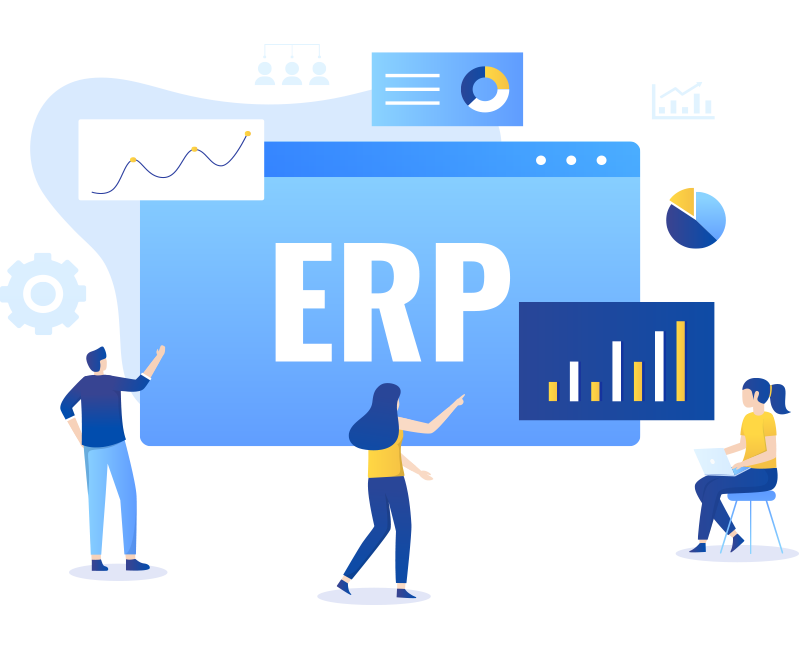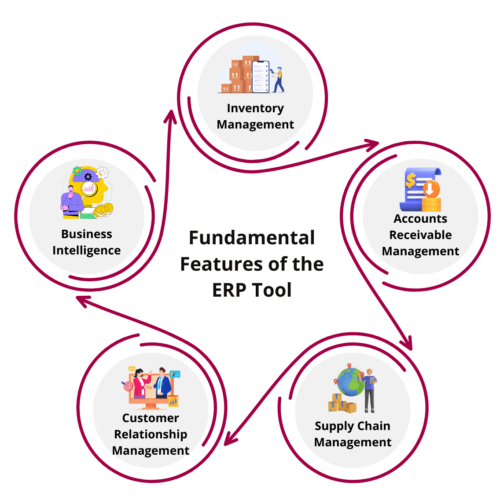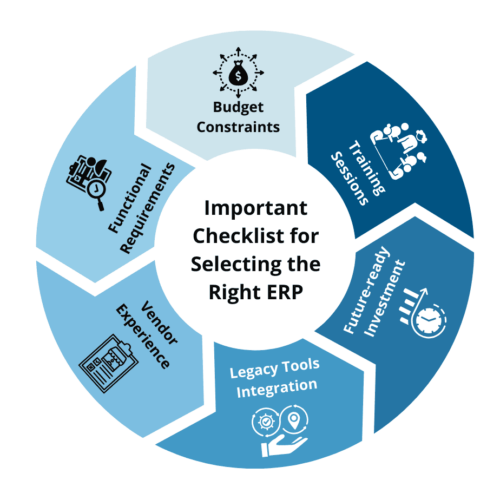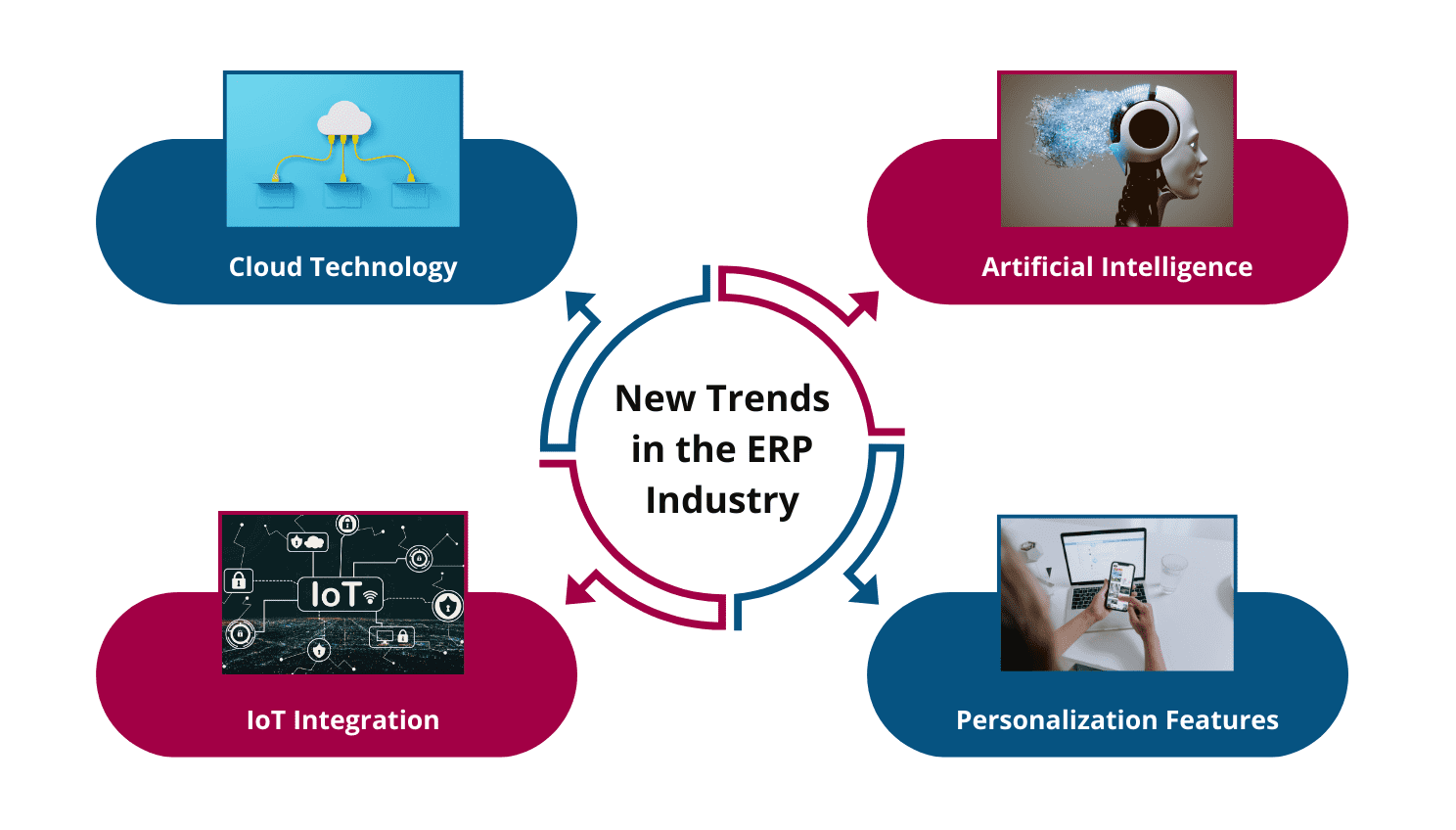ERP Tool
Automate business processes, reduce regulatory complexities, foster collaboration, and drive success with a strategic investment in an ERP tool

What is an ERP Tool?
ERP Tool is a complete business planning and management tool that unifies data across all departments and stores it into a common database in standardized data fields, to empower decision-makers with powerful analytical tools and comprehensive reporting functionalities.
ERP Software plays a crucial role in the growth and success of an organization. It acts as a centralized platform for information management and sharing that aids core business operations such as production, inventory, supply chain, customer support, and finance, among others. The use of ERP is transforming various industries across the world.
Fundamental Features of the ERP Tool
As we’ve seen in the “What are ERP tools” section, they encompass a wide range of modules and functionalities that contribute to the growth and success of your business. Here are some of the core features:

1. Inventory Management
Setting optimum inventory levels is crucial for keeping your business costs lower. The Inventory Management System provides key insights into the stock trends. It automates the calculation of the Inventory Turnover Ratio and helps you eliminate stockouts and excess stock situations, further contributing to cost reductions.
2. Business Intelligence
BI Tools convert long & complex datasets into actionable insights. It analyzes data points and uncovers new trends & patterns (such as sudden spikes in the demand for products). It aids decision-makers with strategic planning and decision-making with all the data at their fingertips.
3. Customer Relationship Management
With the CRM System, classifying customers into different segments, prioritizing high-revenue yielding customers, tracking their journey, and finding cross-sales opportunities, become easier than ever.
4. Supply Chain Management
The Supply Chain Management in ERP brings efficiency into the company’s supply chain operations by automating various tasks such as invoice generation, order placement, order scheduling, and shipment tracking, among others.
5. Accounts Receivable Management
The AR Automation functionality automates the business processes of tracking and managing the customer’s credits and cash receipts. It comes with various features such as automated alerts and notifications.
What are Different Types of the ERP Tool?
There are primarily three types of ERP that suit different business needs. Here are they:
1. On-premise ERP
On-premise ERP is a type of ERP tool that is installed on the organization’s IT infrastructure. It doesn’t need continued access to the Internet to access your data and oversee business operations.
Benefits
- Amazing level of customizability to meet your unique organizational needs
- Greater security and control over your data
- No recurring subscription payments
- No vendor dependency
Drawbacks
- Higher upfront costs in the beginning (license fees, hardware upgrade, training costs, etc.)
- You’ll need to invest in a dedicated IT staff to maintain and update ERP on a regular basis
2. Cloud ERP
Cloud ERP is a type of ERP Tool that hosts your data on the vendor’s servers rather than your IT infrastructure. It adopts the Software-as-a-Service (SaaS) model and comes with various advantages over the traditional ERPs.
Benefits
- No significant upfront costs
- Easy accessibility to your data from any part of the world
- Automated backups and disaster recovery for protecting your organizational data
- No need to employ a dedicated IT staff for regular maintenance & updates
Drawbacks
- Cloud-based ERP typically offers limited customizability
- Over the long-term duration, you pay higher costs compared to On-premise
3. Hybrid ERP
A Hybrid ERP is a mix of both On-premise and Cloud-based types that provide the advantages of both ERPs into a single system. It allows you to take advantage of modern technology while retaining control over your data.
Benefits
- Lower cost compared to On-premise solution
- Flexible and adaptable
- No significant upfront costs
- Confidential business data remains on the company’s IT infrastructure
Drawbacks
- The implementation can be time-consuming and complex due to the mixture of two approaches
- This model may not suit certain types of businesses/ industries
Key Benefits of Using ERP Tool
An increasing number of businesses are implementing ERP. Here are some prominent benefits of ERP that benefit businesses of all kinds and sizes:
1. Operational Efficiency
ERP Software in India automates various tasks and frees up your staff from redundant tasks. It lowers the potential for human errors and duplication. Moreover, it facilitates smooth workflow and real-time collaboration between individuals and teams.
2. Cross-functional Data Analysis
An ERP tool consolidates data from different sources and builds a centralized database (also called a Single Source of Truth). It provides access to the most accurate and up-to-date information. For example, Pharma ERP software enables pharmaceutical companies to gain insights into the raw materials & inventory levels and optimize their operations to save cost & improve quality.
3. Data Security
ERP tool comes with state-of-the-art encryption technology, automated regular data backups, and role-based User Access Control. All of this, together, helps you prevent data breaches, financial losses, and disruptions in business activities. By securing customer’s data and your network infrastructure, you adhere to the data security compliance regulations.
4. Optimum Resource Utilization
ERP Tool pulls information from different sources and provides decision-makers a high-level understanding for making timely & informed decisions. ERP’s ability to provide end-to-end visibility into the process and workloads, helps businesses allocate their human resources effectively and assign tasks to the right person.
5. Proactive Risk Mitigation
ERP tool helps you adhere to the latest regulatory standards, identify risk factors, and prioritize them based on their severity. Its ability to identify, prioritize, and mitigate risks before they could escalate into potential problems, helps you gain long-term stability and success. Proactive risk mitigation can help prevent lawsuits, fines, and penalties.
Limitations of ERP Tool
Now, let us discuss some of the limitations and what could go wrong with the implementation process.
1. Implementation Delays
The implementation process may get delayed due to several reasons such as poor planning & research, cash crunch, or technical challenges.
2. Data Migration Issues
Data migration is the process of moving your data from different sources into the ERP database. Data filtering and conversion issues may occur during migration.
3. Minor Disruptions
Minor disruptions may occur during the day-to-day business functioning. However, you can avoid it by implementing your ERP application in a phased manner from one department to another.
4. Integration Challenges
Some low-quality ERPs cannot be integrated with third-party legacy systems. You can avoid it by consulting with your ERP vendor before making your purchase.
Important Checklist for Selecting the Right ERP Tool
Here’s an important checklist to consider for selecting the right ERP tool:
1. Consider Budget Constraints
Budget is the first and foremost thing to consider during ERP implementation. Make sure that ERP aligns with your budget. Sometimes, additional costs may add up for extended training sessions, advisory, technicalities, etc.
2. Functional Requirements
Conduct regular meetings with the Executives who will be ultimately funding your ERP investment. Break down the features and capabilities that your business will need, and how ERP will fulfill it. Select an ERP that fits your unique company and industry requirements.
3. Vendor Experience
Another thing that matters the most during ERP selection is your vendor’s experience. Make sure that you select a vendor with extensive knowledge and experience in the industry to ensure he understands your unique needs.
4. Legacy Tools Integration
Some companies prefer using multiple disparate systems alongside their ERP. Make sure your ERP supports integration with legacy tools to ensure seamless communication and data sharing between multiple systems.
5. Future-ready Investment
Enterprise Resource Planning systems are often called a long-term investment, and rightly so. Make sure that your ERP is scalable, adaptable, and customizable so that it will meet your growing needs with an increase in your workflow and business complexities. You won’t have to suffer from disruptions in everyday activities.
6. Training Sessions
Training is an essential part of the implementation process. It will help your employees gain confidence, and improve their productivity. Ultimately, it will help you meet your strategic business goals and objectives.
Real-world Examples of ERP Usage in Different Industries
According to a research report by Globe News Wire, the ERP Tool market is set to reach $93.34 Billion by 2028, growing at a CAGR of 9.2% during the forecasted period of 2021-28.
As we’ve covered in the “What are ERP tools” section, ERPs are empowering modern-day businesses in various ways. Here are some examples of ERP’s usage in numerous industries:
- Manufacturing Industry: Manufacturing ERP Software helps manufacturers with production planning, effective waste reduction, and resource optimization.
- Food Industry: ERP for Food Industry provides food producers with intelligent formula management and an automated alert system for effectively managing their food materials.
- Chemical Industry: ERP for Chemical Manufacturing plays a critical role in the supply chain process. It also helps them stay compliant with the latest safety & regulatory standards.
- Furniture Industry: ERP for Furniture Manufacturing maintains extensive customer data, and helps furniture manufacturers process orders faster, and gain better control over costs.
New Trends in the ERP Industry
Much like any other industry, the ERP industry has gone through tremendous transformation in recent years. Businesses across the world are adopting new trends and techniques to increase productivity & efficiency.
1. Cloud Technology
In today’s age of the Internet, everybody is leveraging the cloud technology to make their data accessible at any time & anywhere. ERP is no exception. Cloud-based Enterprise Resource Planning software eliminates the need to host a large-scale physical IT infrastructure and pay a huge upfront ERP cost.
2. Artificial Intelligence
Artificial Intelligence (AI) and Machine Learning (ML) are upgrading businesses to the next level to achieve greater operational efficiency. AI’s ability to analyze long & complex data within minutes and derive meaningful conclusions, helps businesses to make timely & informed decisions.
3. IoT Integration
Enterprise Resource Planning ERP helps businesses to speed up their logistical operations and reduce shipping delays by building a network of interconnected devices, called the Internet of Things (IoT). These devices capture data and transmit it in real time for better forecasting and decision-making.
4. Personalization Features
The personalization abilities of Enterprise Resource Planning ERP are helping businesses meet their unique operational needs and achieve a higher level of productivity. An increasing number of businesses are understanding the need to customize the ERP to align it with their workflow requirements.
Unlock Your True Business Potential with Next-gen Sage X3
ERP tool provides a unified platform to integrate and automate various business processes. It defines and standardizes various processes, minimizes resources spent on redundant tasks, and builds a solid foundation for end-to-end visibility & profitability.
Sage X3 is an out-of-the-box solution for most modern-day businesses that are looking to streamline their operations, simplify workflow, and benefit from digital transformation. It is a multi-lingual, and multi-currency ERP that can accommodate different tax systems.
Top Industries Leveraging ERP Software
Food & Beverage
Alcohol
Pharmaceuticals
Advertising
IT Services
Furniture
Manufacturing
Auto Ancillary
Pharma Trading
Packaging
Medical Device
Chemical
Plastic
Brewery
Logistics
Automotive
Related ERP Articles
Frequently Asked Questions
1. What are the Must-have Modules in the Best ERP Tools?
A module is an integral component of ERP that tailors to specific business needs. The exact modules available in your ERP will depend on its functional capabilities and your budget.
Here’s the list of must-have modules in the best ERP tools:
2. How Does the ERP Tool Enhance Supply Chain Operations?
3. How is an ERP Tool Different from an MRP Tool?
Material Requirements Planning (MRP) is considered a subset of ERP, rather than an independent software. This is because it mainly deals with manufacturing operations (such as Master Production Schedule, estimating materials requirements, production planning, and maintaining minimum inventory threshold), whereas an ERP Tool is an all-comprehensive solution that deals with manufacturing, supply chain, customer support, and lead management to financial management.
4. How Long Does the Implementation of ERP Tool Take?
The implementation process may take anywhere from several weeks to a year, depending on the company’s size and complexity. Several factors can affect the implementation time such as the level of the research, the functional modules of ERP you have chosen, and legacy integration requirements. Developing a solid timeframe estimation and conducting regular performance evaluations will help you speed up the implementation.
5. How Does the ERP Tool Aid Regulatory Compliance?
Schedule Product Tour
"*" indicates required fields

